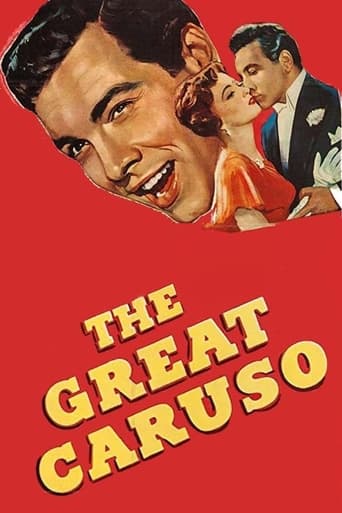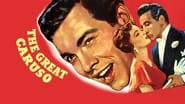belcanto26
To begin with, this film, whatever its weaknesses, was largely responsible for many young people buying operatic recordings in the early 1950's. Lanza, of course, had a great, though uncultivated operatic voice, and his lack of lengthy formal training is obvious who anyone who knows what real operatic singing is supposed to sound like. Yes, he certainly had the range, power, and volume to sing every opera represented in this film, but his singing is far from polished or "finished". But no matter. He hit with a tremendous impact, and MGM made the most of it. The film itself really does not at all stick to the facts about Enrico Caruso. Caruso, certainly the greatest tenor of his time, died in Naples in 1920 after a somewhat lingering illness. The film opts for a more Hollywood-type ending. Lanza, moreover, was only a minimally competent actor, and, needless to say, his greatest moments are when he's singing Puccini, Donizetti, etc. Ann Blyth makes a positive account of herself as his wife Dorothy, and the celebrated Metropolitan Opera soprano Dorothy Kirsten actually comes off convincingly as a celebrated soprano who sang with Caruso (Lanza) in most of his Met performances. The operatic scenes are reasonably well done (by Hollywood standards), but as a biographical document of Caruso ----- it's neither accurate nor minimally plausible. I am sure that this film was lauded with great acclaim upon the time of it's release, but today, is just ends up being a nice two hours of entertainment ----- though it stands as a good testimony to the potential that Lanza had as a great tenor ------ a potential that was never realized. This was a great voice that could have been an operatic talent of the century had Hollywood not intervened and ruined it.
Paul Reichberg
I was 12 living in the coastal industry city of Luleå. I had never heard of Opera. My father was a movie projectionist. One evening i happened to see The Great Caruso. It was a breathtaking experience deep into my body. I was caught for ever by opera and I remember the deep sadness I felt in 1959 when my idol Mario Lanza died (similar to my sons feelings some 30 years later when John Lennon was killed). I have the Video and I have seen it many times on TCM Cabel TV - The Great Caruso will stay forever as the film that opened my eyes and emotions for music in general and opera in particular. Thank You MGM, Caruso but in particular thank You Mario Lanza.
willrams
Yes, Be My Love was Mario Lanza's skyrocket to fame and still is popular today. His voice was strong and steady, so powerful in fact that MGM decided to use him in The Great Caruso. Lanza himself thought he was the reincarnation of Caruso. Having read the book by Kostelanitz who wrote a biography of Lanza, he explains that the constant practise and vocal lessons became the visionary Caruso to Lanza. There is no doubt that Lanza did a superb job in the story, but the story is not entirely true; blame it on Hollywood! I used to practise singing his songs years ago, and became pretty good myself until I lost my voice because of emphysema/asthma ten years ago. Reaching the high note of Be My Love is not easy; but beautiful!
mila-11
The Great Caruso displays the unique talents of Mario Lanza. He shows great acting capacity and is in top form as a lyrical singer, paired with Dorothy Kirsten, soprano of the Metropolitan Opera. Indeed, I dare to say that he performs some songs better than Caruso (check A'Vuchella from Tosti and La Danza from Rossini). The MGM art and music departments also did a good job. This movie could be perfect, were it not for the awkward presence of Ann Blyth; we see that she is trying her best, dressed in the fifties style in scenes just before 1920 - unforgivable. Lanza deserved a better leading lady, and Blyth should stick to less demanding productions. Also notice that Ms. Kirsten sings most of the opera duets of the film with Lanza, giving the wrong notion that Caruso had a kind of permanent leading soprano.


